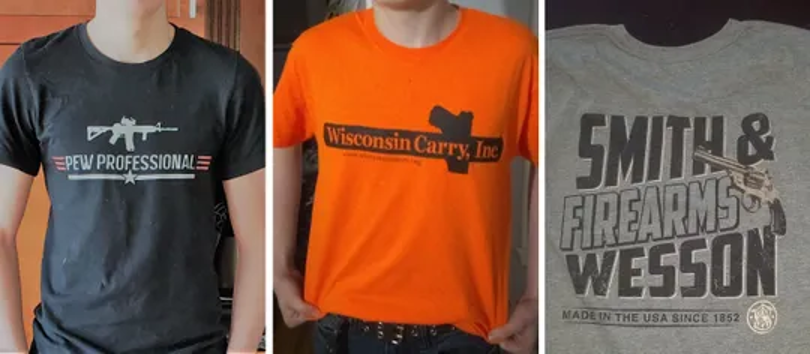To Ban or Not to Ban - That is the Question: The Latest on Student Free Speech RightsBy Attorney Melissa Thiel Collar, Legal Counsel - Green Bay Area Public School District The Summer of 2022 was not reserved just for important legal decisions from the United States Supreme Court. A lower federal court, the 7th Circuit Court of Appeals, that has jurisdiction over Wisconsin, also issued an important legal decision - one that addresses students’ free speech rights under the First Amendment. It is important to remember that students have constitutional rights to free speech and the right to express themselves through various means, including their clothing. A little over 50 years ago, the United States Supreme Court ruled that students don't “shed their constitutional rights to freedom of speech or expression at the schoolhouse gate.” Tinker v. Des Moines Independent Community School District, 393 U.S. 503 (1969), However, 1st Amendment free speech rights are not unfettered. Such rights do not protect speech:
Requirements and standards for student dress are analyzed as student speech. If a student is wearing a shirt that portrays illegal drug use, a threat, or is vulgar, lewd, indecent or plainly offensive, a school district has the ability to restrict such dress/expression. In early 2020, a movement made its way to Wisconsin public schools in which students wear t-shirts depicting firearms in support of the right to bear arms under the Second Amendment to the United States Constitution. This movement is referred to as #2ATuesday. Not unlike other school districts in Wisconsin, students in the Neenah Joint School District and the Kettle Moraine School District wore shirts depicting weapons or the right to carry weapons. Administrators in these districts requested students to either remove the t-shirts or cover them up, contending that the shirts violated their district’s dress code policy. Below are the images of the shirts students wore in these cases.  1Hazelwood School District v. Kuhlmeier, 484 U.S. 260 (1988).
2Morse v. Frederick, 551 U.S. 393, 397 (2007). 3Virginia v. Black, 538 U.S. 343 (2003). 4Bethel School District No. 403 v. Fraser, 478 U.S. 675, 685 (1986). In both Neenah and Kettle Moraine, neither districts’ applicable board of education policy specifically prohibited students from wearing clothing depicting firearms. Rather, the dress codes generally prohibited “disruptive” or “inappropriate” clothing. The administrators in both districts interpreted “disruptive” or “inappropriate” to include clothing that made references to or depicted weapons, regardless of whether the message was in support or in opposition to the right to bear arms. Wisconsin Carry, Inc., filed lawsuits on behalf of the students in federal court alleging that prohibiting the students from wearing the shirts violated their First Amendment rights. Judge Griesbach of the Eastern District Court held the shirts could be banned as such prohibition was viewpoint neutral and reasonably related to the legitimate pedagogical concerns of reducing student anxiety and preventing the aggression that results from seeing an image of firearms. N.J v. Sonnabend and A.L. v. Kaminski, 536 F. Supp. 3d 392 (E.D. Wis. 2021). To reach his holding, Judge Griesbach did not apply Tinker but instead relied on the 7th Circuit Court of Appeal’s decision in Muller ex rel. Muller v. Jefferson Lighthouse School, 98 F.3d 1530 (7th Cir. 1996), which relied on the Supreme Court’s holding in Hazelwood School District v. Kuhlmeier, 484 U.S. 260 (1988). On June 15, 2022, the 7th Circuit Court of Appeals overturned Judge Griesbach’s decision holding that he applied the wrong legal standard. N.J. v. Sonnabend, Case No. 21-1959 (7th Cir. June 15, 2022). Rather, in accordance with the United States Supreme Court holding in Tinker, the t-shirts only could be prohibited if school officials reasonably forecasted that the speech “would materially and substantially disrupt the work and discipline of the school.” Based on the 7th Circuit Court of Appeals holding in Sonnabend, a blanket prohibition on clothing depicting or referring to weapons is likely unconstitutional. It is important to be aware of your board of education policy and what types of speech is prohibited. The Green Bay Area Public School District Board of Education Policy 443.1 provides two bases for the restricting of clothing as it pertains to weapons. Clothing depicting weapons only may be restricted in accordance with the following:
The 7th Circuit Court of Appeals remanded the Sonnabend case back to the Eastern District to determine if the t-shirts worn by the students actually created a substantial disruption or material disruption. When schools are evaluating the need to restrict speech or expression, the focus of the evaluation should not be on what is being worn, but rather, whether it causes a disruption to education. Mere speculation that it could cause a disruption is not sufficient to meet the “Tinker Test” standard. Put simply, if the clothing item does not create a substantial disruption or material interference, a student cannot be restricted in the ability to wear clothing that depicts a firearm. *This article was written by Attorney Melissa Thiel Collar. The views expressed herein are exclusively those of Ms. Thiel Collar. This article was designed to provide general authoritative information and commentary as a service to AWSA members. It should not be relied upon as legal advice. You are encouraged to contact your district legal counsel should you require legal advice regarding this topic. You may also direct your Level I legal questions to Malina Piontek at 608-497-3037 or [email protected]. |
